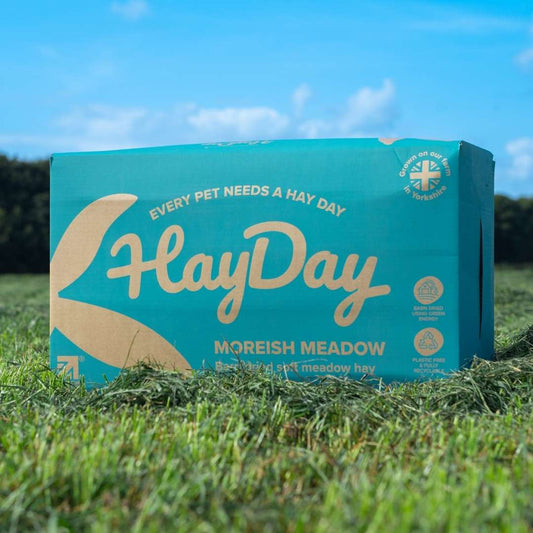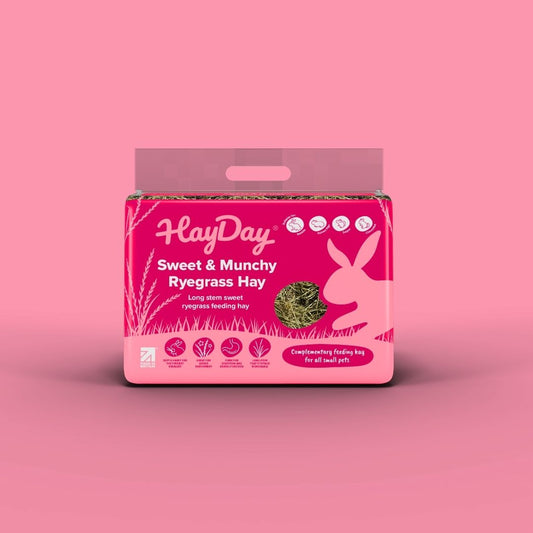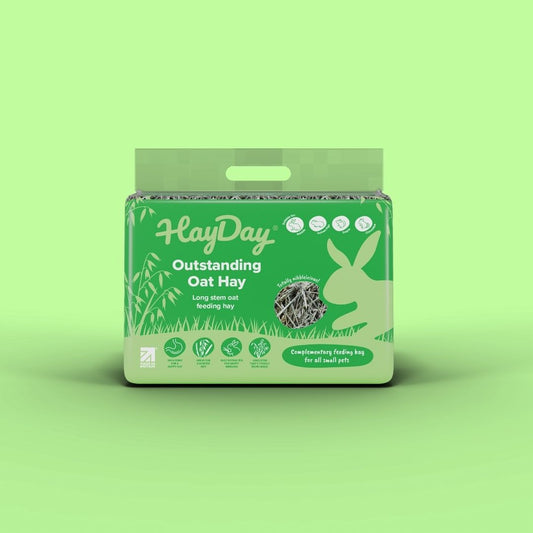When making a decision about bringing a rabbit into your home, whether as a first pet or an addition to your family, it’s important to be well-informed and prepared.
At HayDay, we care deeply about helping you understand the full ins and outs of rabbit ownership and to choose the right companion for your lifestyle.
This guide will walk you through everything from the fundamental differences between male and female rabbits to a thoughtful decision-making process.
It also covers the essential care expectations because rabbits are unique pets who deserve more than just basic attention.
Understanding Male vs. Female Rabbits: Behavioural and Health Differences
Male rabbits - Bucks
Male rabbits, known as bucks, tend to exhibit friendlier and more laid-back personalities, particularly after they are neutered.
This procedure generally calms them down, reduces territorial spraying, and helps them bond more quickly both with their human caretakers and other rabbits.
Female Rabbits - Does
In contrast, female rabbits or does may initially show stronger territorial instincts and a more independent demeanor.
They can also demonstrate behaviours such as digging and occasional aggression, especially before being spayed.
Spaying female rabbits is crucial, not only to reduce hormonal behaviours but also to prevent severe health risks such as uterine cancer, a dangerous condition female rabbits are prone to without this surgery.
Also, this prevents false pregnancies which can cause a female rabbit to be even more aggressive to want to defend her nest and babies.
The Commitment Required for Rabbit Care: Why They Are Not Starter Pets
Rabbits often captivate prospective pet owners with their gentle charm, but they require much more than casual care.
Unlike cats or dogs, rabbits need a carefully managed environment that includes a spacious enclosure with plenty of room for exercise and exploration.
Their diet must consist mainly of fresh high high-quality hay, supplemented with leafy greens and limited pellets, as their digestive systems are delicate and specialised.
Daily social interaction and enrichment are essential to prevent loneliness and stress, which can lead to health issues or destructive behaviours.
Furthermore, maintaining a clean space and providing veterinary care, including vaccinations where applicable, is vital for their well-being.
That’s why at HayDay, we emphasise that rabbits are best suited for experienced owners who understand their complexity.
Making the Choice: A Thoughtful Decision-Making Process for Future Rabbit Owners
Choosing the right rabbit isn’t just about picking a pet; it’s about matching an animal’s needs with your capacity to meet them.
Start by realistically assessing your experience with animals and the time you can dedicate to a pet.
Beginners often find neutered males easier to bond with due to their generally gentler nature, while those with more experience may appreciate the richer personalities that female rabbits offer, albeit with some extra patience and care.
Spending Time With Your Bunny
Next, consider your living space and daily routine.
Rabbits thrive in environments that allow them room to roam safely and require that their living area be rabbit-proofed against chewing and digging.
Without this, they can get stressed or cause damage, which leads to unhappy pets and owners.
Think about your commitment
Think deeply about your long-term commitment. Rabbits can live 8 to 12 years or more, meaning you are pledging to care for them over a significant part of your life.
This responsibility includes diet management, exercise, veterinary visits, and behavioural care.
A key component that many overlook is the social nature of rabbits. Keeping a single rabbit demands a lot of time from you to compensate for the lack of companionship.
Many people recommend adopting rabbits in pairs or pairs that can be carefully introduced, as this greatly enhances their quality of life.
Final Thoughts: Why Choosing the Right Rabbit Means More Than Just Gender
At HayDay, we believe the best choices come from understanding that each rabbit has a personality beyond being male or female.
Spending time with potential companions, whenever possible, allows you to find a rabbit with a temperament that resonates with your household. Remember, rabbits are intelligent, sensitive, and social creatures who need owners ready for commitment and care.
Rabbits are incredibly rewarding pets for those prepared to meet their needs. They offer companionship, personality, and joy but only in homes ready to provide proper care, environment, and affection.
For those ready to embrace this rewarding journey, HayDay offers not only expert advice but the best quality hay and products essential for keeping rabbits healthy and happy.
Choosing wisely today will lead to many joyful years with your rabbit companion.
FAQS
Why is hay so important in a rabbit’s diet?
Hay is the foundation of a healthy rabbit diet because it provides the essential fibre needed for proper digestion and helps wear down their continuously growing teeth. Without enough hay, rabbits can suffer from digestive problems and dental issues.
How much hay should a rabbit eat daily?
Rabbits should have unlimited access to fresh hay every day. It should make up about 80% of their diet to keep their digestive system moving and their teeth healthy. Always provide fresh, clean hay, replacing any that becomes damp or soiled.
Can rabbits eat other plants besides hay and greens?
Rabbits enjoy a variety of leafy greens and safe vegetables along with their hay. It’s important to introduce new foods slowly and avoid anything toxic, such as iceberg lettuce, rhubarb, or plants treated with pesticides.
Why should I avoid feeding too many treats or sugary foods to my rabbit?
Rabbits have sensitive digestive systems that can easily be upset by sugary or starchy treats like carrots and fruit. Too much sugar can lead to obesity, digestive disturbances, and dental problems.
Useful Links
Aggression in Rabbits - Rabbit Welfare Association & Fund
Top UK Rabbit Breeds & A Guide to Responsible Rabbit Care - HayDay HQ





